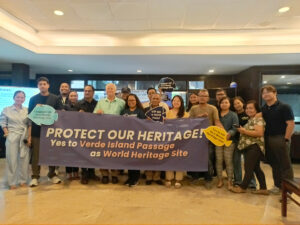The Verde Island Passage (VIP), known as the “Amazon of the Ocean” for its highest concentration of marine shorefish biodiversity, is now poised to become a UNESCO World Heritage Site.
“We believe that this status would not just spotlight the VIP… It would also add another layer of protection to secure the VIP’s very important ecosystems,” Martha Vergara, OIC Deputy for oceans and climate at the Center for Energy, and Development (CEED) said during the media conference last Friday.
The VIP is situated in a strait that separates the islands of Luzon and Mindoro, where over 1736 overlapping species coexist in just a 10 sq. km area.
According to an analysis by Prof. Kent Carpenter, a marine biologist, and other scientists who studied the waters of countries within the Coral Triangle, discovered that the VIP is the epicenter with “the highest concentration in the world of marine species,” Mr. Carpenter said.
It is also home to 50% of marine species in the Indo-Pacific region, he added
Apart from its rich biodiversity, the VIP is also a lifeline for two million residents who rely on it for fishing and tourism.
According to CEED, the strait generates about P12 Billion in annual income from fishing alone, which residents of the provinces of Batangas, Marinduque, Occidental and Oriental Mindoro, and Romblon rely on.
Despite its ecological and economic significance, the VIP is facing increasing threats from various anthropogenic activities, including those caused by the shipping industry, energy expansion, fossil fuel extraction, and climate change.
“They put pressure on the fragile ecosystems in the VIP,” Ms. Vergara said.
The following anthropogenic activities, along with the devastating 2023 Mindoro oil spill, have resulted in damages worth P41.2 billion, according to CEED.
Designating the VIP as a World Heritage Site will not only affirm its global significance but also rally support for its protection, CEED said.
No fisherfolk left behind
As the bid for the VIP to become a World Heritage Site is underway, the issue of poverty among fishermen should also be addressed, a community advocate said.
“It’s a prerequisite to help alleviate poverty in the island and all the communities in the VIP to secure its protection,” Gela Petines, Founder of Batang VIP said during the media conference last Friday.
Ms. Petines is a community advocate for Barangay San Andres, a community in Isla Verde, Batangas.
Despite the community living near the center of marine shorefish biodiversity, Ms. Petines said many households still fall below the poverty line, earning less than P5000 a month.
“It is the center of the richest marine biodiversity but why is it also home to the poorest of the poor, it does not make any sense,” she said.
The poverty on the island has been further worsened by the drastic decline in fishermen’s catch in recent years, forcing them to sail farther and into deeper reefs.
The decline in fish catch has been caused by the surge in the island’s population, climate change, pollution, industrial activities, and typhoons, Maximo Bayuba, fisherman and the Vice President for external affairs for Bukluran ng Mangingisda sa Batangas said.
“Noong una nakakahuli kami in one-night mayroong 25 kilos hanggang 30 kilos. Ngayon ang nahuhuli namin at nahuhuli ng mga anak ko ay meron lang higit isang kilo, meron lang maiuulam ang isang pamilya [At first, we used to catch 25 to 30 kilos in one night. Now, what my children and I catch is just over a kilo, barely enough for one family’s meal,” Mr. Bayubay said.
Some fishermen in VIP even practice compressor fishing, where they dive to at least 40 feet underwater, taking in air from an air compressor powered by their boat.
This fishing practice is discouraged on VIP due to the risk of decompression sickness or illness, which could potentially lead to death.
“It is not something that they want to do, it is just out of necessity,” Ms. Petines said.
This is followed by sectors such as farmers (30%), children (26.4%), and individuals residing in rural areas (25.7%).
“These sectors had the highest proportion of individuals belonging to families with income below the official poverty thresholds compared to the other basic sectors,” PSA said in a statement.
Ms. Petines also noticed that the dropout rate in Brgy. San Andres is notably high.
In her conversation with the children, they usually say “Marunong na akong mangisda [I already know how to fish],” prompting them to leave school as early as Grade 3, often around the age of 10.
If VIP becomes a World Heritage Site, Ms. Petines and Mr. Bayubay hope for support to help communities transition to sustainable livelihoods that are both financially and environmentally sustainable.
This is in light of potential stricter fishing regulations to protect VIP’s marine biodiversity. – Edg Adrian A. Eva
